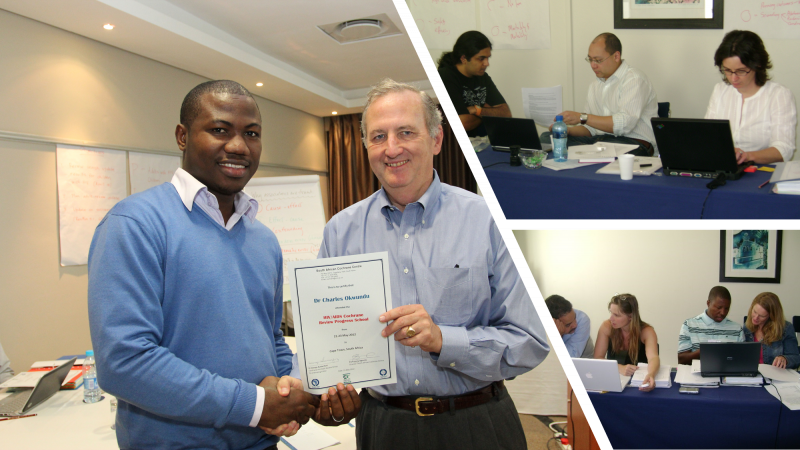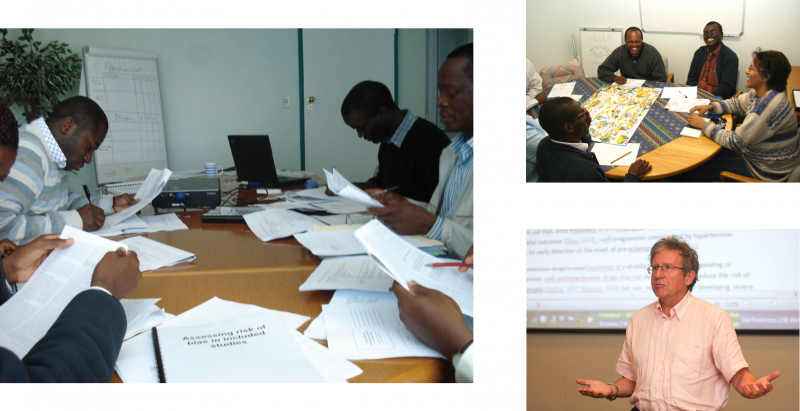Three new Cochrane entities were launched in Africa, one each in Nigeria, Kenya and Cameroon during 2021. However, whilst the centres were recently launched, their work tracks back many years. Cochrane research, training and advocacy in these countries date back to the late 1990s, with African collaborators working to produce high-quality reviews and promote their use in policy and practice through building relationships with policy makers and practitioners, and training future review authors to do reviews on questions of regional relevance.
In particular, African Cochrane authors were part of important systematic reviews on HIV/AIDS, tuberculosis, malaria and health systems in the late 1990s. The first formal programmes to build capacity included the HIV Mentoring Programme in collaboration with the Cochrane Collaborative Review Group on HIV Infection and AIDS (Cochrane HIV/AIDS Group) at the University of California, San Francisco and the Reviews for Africa Programme (RAP), a research and training initiative funded by the Nuffield Commonwealth Foundation which brought together Cochrane South Africa, the Cochrane Infectious Disease Group at the Liverpool School of Tropical Medicine, and the Cochrane HIV/AIDS Group. The main activities involved a fellowship programme with structured training, and support for first-time Cochrane authors, and pairing them with a mentor with whom to work on their first Cochrane Reviews.

Several of the current leaders of the four African groups did their initial Cochrane reviews as mentees on these and other scholarship programmes and built on this grounding to establish and develop the formally registered Cochrane Centres in their countries. Review authors from the three entities have been part of collaborative research networks funded by DFID - the United Kingdom Department for International Development (recently replaced by the Foreign, Commonwealth & Development Office) and led by the Liverpool School of Tropical Medicine going back to 2005. This dedicated funding was an investment in building leadership in evidence synthesis in LMICs and provided a basis for multiplier funding and expanded collaborative projects.
As the Cochrane SA Deputy Director, Nandi Siegfried was one of the instigators of the HIV Mentoring Programme along with the Cochrane HIV/AIDS Group based at the University of California, San Francisco led by George Rutherford and Gail Kennedy.
“They were interested in increasing the number of people doing reviews from the contexts where HIV/AIDS was rife and particularly in unpacking the heterosexual epidemic and the potential political and other implications of the work. They specifically wanted African authors.”
Although Siegfried pointed to many initial challenges – not least the need to do a lot with very little funding, the HIV Mentoring Programme was initiated and ran successfully, with Cochrane SA also becoming a Satellite office of the Cochrane HIV/AIDS Group.
“At an individual level it was highly valued by the mentees,” she said, “They received methodological support they would not otherwise have had access to which was not clouded by academic competencies. It was collaborative, supportive and in a nice environment. There was a good cohesive bond. The individual quality of the support meant that people didn’t have to sink or swim – they were assisted.”
“We were aware that what we were doing was something different.”
“At a regional level the vehicle raised awareness of systematic reviews and, in particular, their rigour and robustness,” she added. “I believe the collaboration shifted perceptions of what is possible in the poorer parts of the world.”
“There was huge openness in the early days. A true partnership with lots of leeway on the ground. It was a good time to be part of the collaboration and we made a good contribution to public health. The key thing was the right time, the right place and enthusiastic support despite limited funding.”

By the time Taryn Young joined Cochrane SA in 2004, it was clear that the programme’s mandate should be expanded beyond HIV/AIDS.
“But we needed money to take it further,” she said. “We therefore applied for a Nuffield Training Grant and created the Reviews for Africa programme which had as its objective building capacity for doing Cochrane Reviews in Africa with a focus on TB, Malaria, HIV and anything relevant to Africa. The goal was also to promote evidence-based healthcare in the region. It was a collaborative approach also involving the Cochrane Infectious Diseases Group in Liverpool and the Cochrane HIV/AIDS Group.”
A total of 26 people were trained and mentored when the RAP project formally ended. However, the activities continuing under the mantle of ongoing grants, including the STEPP (Supporting the Translation of Evidence into Policy and Practice) and SUPPORT (Supporting Policy-relevant Reviews and Trials) projects, which specifically focused on promoting the use of reviews in policy, and the ongoing READ-It project.
“It was a great success in building leadership. Many of the RaPpers are now in leadership positions. Those not directly involved in entities are editors in different Cochrane focus groups.”
“It was like an old-fashioned apprenticeship scheme,” said Paul Garner of the Cochrane Infectious Diseases Group who has been involved in the programmes since the beginning. “You give people structured training and supportive networks and get them started. The strategy started with identifying good people – born leaders – and giving them the opportunity to make their mark and perform. There was a good culture of collaboration and support as well as academic leadership. It was about putting the authors first.”
“We were also able to inculcate certain values – participation, research integrity, the principles of good science and the value of high-quality research and collaboration. These extended beyond reviews and built social capital.”
“It was not just developing Cochrane centres but development appropriate to the different countries,” he added. “The mentees were first authors, self-selected, and key performance individuals. It was the right thing at the right time and fabulous to do.”
He also spoke of the leveraging that resulted from the programmes.
“It’s much easier for people in the North to get grant money and to access opportunities for science – they have more time available. You have to identify people with the same vision and link them to joint funding priorities and the possibility of doing quality research. It’s about passing on the responsibility and then walking away.
“It’s very important that such programmes continue to be run from within LMICs and focusing on diseases affecting LMICs. You have to have a philosophy of doing it as an integrated way or it won’t happen.”
